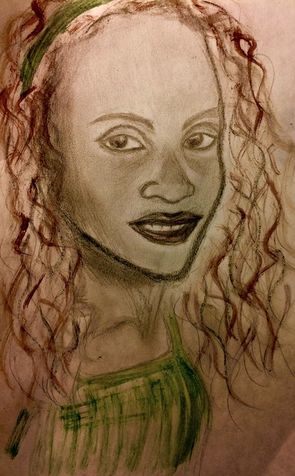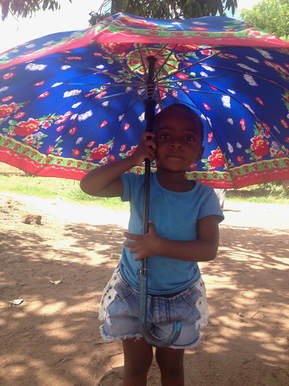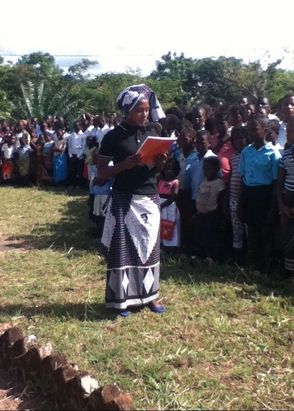 Flávia, the fourth in the story. Flávia, the fourth in the story. Flávia was 22 when we became friends. I was 24. She was married, had a two-year-old, and taught at the local elementary school. We didn't have much in common, but it didn't matter. She didn't think herself beautiful, the fourth of The Great Danes. I disagreed. The first time we met, I thought, this is the most beautiful woman in my world. Flávia spent most mornings at the river. Even on days when other chores were more pressing, or her laundry load was light, she'd toss the dirty clothes into a bucket, hoist it onto her head, and walk the mile-long trail down to the water with her friends. They'd arrive together, chatting in the local language, and claim their washing spots along the riverbank. They'd each lug a craggy rock to the bank to use as a surface for scrubbing their clothes, splashing river water over each item and squeezing it out on the rock until the water ran clean into the stream. Flávia made a show of washing jeans - her jeans, her daughter's jeans, her husband's jeans, my jeans, and on. She'd grab onto the waistband, hurl them into the air in a spiral over her head, and then slap them down onto the rock beneath her. She'd let out a war cry when the jeans made contact with the rock. It was never clear why the centripetal force was necessary. Again, it didn't matter.  Flávia's daughter, Cesária Flávia's daughter, Cesária Beauty evolves all around us, constantly. We see it change in our lives when we discover new wonders. We witness its transformation in our friends who are growing and learning. Perhaps there is a kind of law of conservation of beauty, because on most good days, it's not destroyed, it just changes form. Flávia was very good at hiding the things that were not beautiful in her life. "Mana Katarina, você tem secreto?" It means - "Sister, can you keep a secret?" She said it only one time to me over the course of our two years together. Other secrets of hers were perhaps never spoken. When she was 23, Flávia and her husband split up, and he moved to a city nearby. Flávia's daughter, Cesária, stayed with her in our small farming community of Lioma.  Flávia reading the mayor's announcements during a town meeting Flávia reading the mayor's announcements during a town meeting When something breaks in a person, they either adapt, or they die. We see people who adapt gracefully. We see people who struggle to change. But eventually, the outcome is the same - we've either adapted, or we're dead. It's very simple. The divorce forced a gradual change in Flávia. She adapted. And in her new form she became unafraid - to talk back, to tell the truth, to tell lies. Flávia and Cesária became inseparable. The love she sought in her marriage evolved into something different, and perhaps more worthwhile, in her daughter. Flávia ensured every decision would benefit Cesária. And so she chose to devote her life to the one person who truly needed her. And for that, she is the fourth in the story of The Great Danes.
0 Comments
Leave a Reply. |
Here you will find stories of strength, connection, and cause.
Archives
September 2017
Categories |
 RSS Feed
RSS Feed